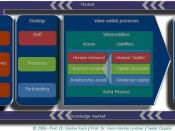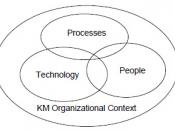The dynamics of business and the relationships with organizations that involve the use of knowledge are both evolving. Knowledge is powerful and valued as something to leverage over the competition. The push towards information technology and the Internet have made information and knowledge even more valuable. Although an intangible, knowledge is now referred to as intellectual property. So cherished has it become to organizations that trust then becomes an issue because certain knowledge cannot be shared with just anyone. It might be stolen or abused. Since not everyone shares the same values and goals, trust is not a given. Trust is also important in producing team work or a successful output from a group project involving multiple departments, functions, or companies.
With these changes are new types of trust that are emerging on a parallel path with the development of the economy. Trust is becoming a greater issue in terms of the knowledge-based activities that pervade today's information-intensive organization.
This paper examines how the concept of trust, including internal and external trust, plays a role in today's organizational systems and processes.
As companies have come to value information and knowledge as a competitive advantage, the practice of knowledge management has expanded. It is considered a "discipline" that collects, manages and puts knowledge in action in order to keep a circular flow and continual development of that knowledge (T3 Group, 1). Knowledge management involves "problem solving; creativity; reliance of individuals; high levels of education; and a degree of professionalism" (Ellingsen, 195).
An interesting note about research on the subject of knowledge is those scientists, engineers, and other people who have ready access to databases and other "impersonal sources" of information still opt for knowledge from their colleagues or superiors (Levin and Cross, 1).
What comes into play with knowledge and sharing...


